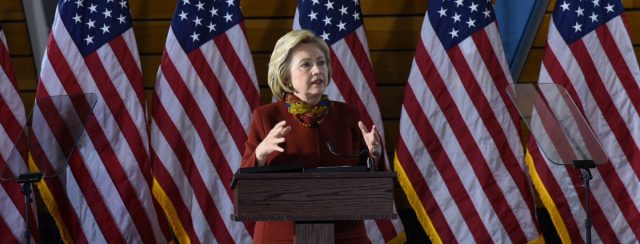
Presidential candidate Hillary Clinton has called for a "Manhattan-like project" to help law enforcement break into encrypted communications. This is in reference to the Manhattan Project, the top-secret concentrated research effort which resulted in the US developing nuclear weapons during World War II.
At Saturday's Democratic debate (transcript here), moderator Martha Raddatz asked Clinton about Apple CEO Tim Cook's statements that any effort to break encryption would harm law-abiding citizens.
"You've talked a lot about bringing tech leaders and government officials together, but Apple CEO Tim Cook said removing encryption tools from our products altogether would only hurt law-abiding citizens who rely on us to protect their data," Raddatz said. "So would you force him to give law enforcement a key to encrypted technology by making it law?"
Clinton said she "would not want to go to that point" of forcing companies like Apple to give encryption keys to law enforcement.
"I would hope that, given the extraordinary capacities that the tech community has and the legitimate needs and questions from law enforcement, that there could be a Manhattan-like project, something that would bring the government and the tech communities together to see they're not adversaries, they've got to be partners," Clinton continued. "It doesn't do anybody any good if terrorists can move toward encrypted communication that no law enforcement agency can break into before or after. There must be some way. I don't know enough about the technology, Martha, to be able to say what it is, but I have a lot of confidence in our tech experts."
Clinton added some caveats. "Maybe the back door is the wrong door, and I understand what Apple and others are saying about that," she said. The US also has to "balance liberty and security, privacy and safety." But ultimately, Clinton said she wants tech companies to cooperate with the government. "Otherwise, law enforcement is blind—blind before, blind during, and, unfortunately, in many instances, blind after," she said.
Though Clinton said she has "confidence in our tech experts" to solve this problem, she has continued pushing for weakening encryption despite warnings from Apple, Google, Microsoft, and other tech companies that putting encryption back doors into their products would weaken data security for everyone.
Cook discussed encryption further last night on 60 Minutes. The Apple CEO explained encryption back doors would help anyone—not just law enforcement—access people's private information.
"On your smartphone today, on your iPhone, there's likely health information, there's financial information," Cook said. "There are intimate conversations with your family, or your co-workers. There's probably business secrets and you should have the ability to protect it. And the only way we know how to do that, is to encrypt it. Why is that? It's because if there's a way to get in, then somebody will find the way in. There have been people that suggest that we should have a back door. But the reality is if you put a back door in, that back door's for everybody, for good guys and bad guys."
Cook pointed out that Apple provides information to law enforcement to comply with warrants, as is required by law.
"In the case of encrypted communication, we don't have it to give," Cook said. The US doesn't need to make a tradeoff between privacy and national security, he said.
"I think that's an overly simplistic view. We're America. We should have both," Cook said.
reader comments
331